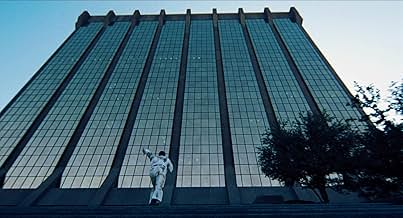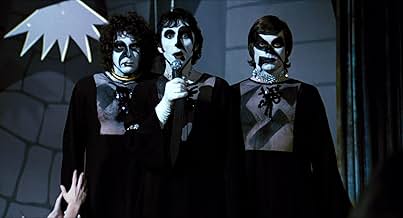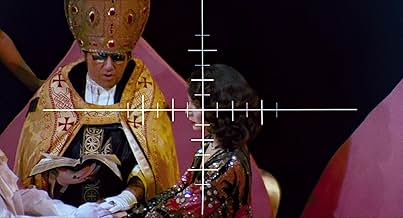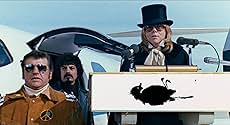A disfigured composer sells his soul for the woman he loves so that she will perform his music. However, an evil record tycoon betrays him and steals his music to open his rock palace, The P... Read allA disfigured composer sells his soul for the woman he loves so that she will perform his music. However, an evil record tycoon betrays him and steals his music to open his rock palace, The Paradise.A disfigured composer sells his soul for the woman he loves so that she will perform his music. However, an evil record tycoon betrays him and steals his music to open his rock palace, The Paradise.
- Director
- Writers
- Stars
- Nominated for 1 Oscar
- 3 wins & 5 nominations total
- The Juicy Fruits
- (as Harold Oblong)
- …
- Director
- Writers
- All cast & crew
- Production, box office & more at IMDbPro
Featured reviews
Here we have a film that exists in 3 levels (at least 3 that matter to me):
- this is a film within a social and cultural context. The kind of music we hear here (not the multiple parodies, but the music that is intended to be "good") was a reaction to the 60', or the next step of the evolution. Within the same underground spirit that created this film, there was a growing tendency to extend and invent forms that would accommodate the fantasies of new musicians. That's what today we know as progressive rock. This film would pave the way for Tommy, for Live at Pompei, and for The Wall.
- Paul Williams, great mind, great talent. Much of what works here is his vision, from the mood even to some roots of the story. His parodies are great, but his real stuff is good enough. I enjoyed getting to know him better, and it Is funny that he comes to perform the guy who steals his own music.
- de Palma, who was my first interest when coming to this. The fact is i didn't know so well what to expect, and i ended up appreciating more the other levels than this one of the director. Apparently by this time he had clarified what he wanted to explore, but he was far from mastering any of his enormous visual skills, or this film was such a collective work that he just couldn't make his personal statement so well. Anyway we have here eventually the first split screen of his career (i'm not absolutely sure of this), something he would take all his careers with incredible results. Other than that, we don'te have his magical camera eye yet.
The story matters only for the fact that we have a battle between creative and money grower, something that all the people involved here might know pretty well back in those days.
Jennifer Harper has a pretty face, and illuminates the set when she sings.
My opinion: 4/5
http://www.7eyes.wordpress.com
It's a thoroughly flamboyant, marvelously designed and decorated rock musical that combines the themes of Phantom of the Opera, Faust, and The Picture of Dorian Gray. William Finley stars as Winslow Leach, a naive, trusting singer-composer who is taken advantage of by conniving producer Swan (who's played by real-life singer-composer-actor Paul Williams). Several circumstances later, the disfigured Leach seeks revenge against Swan while falling madly in love with aspiring pop star Phoenix (the radiant Jessica Harper).
The late, great character star Finley and the engaging Williams were never better than in this funny and fast paced exercise in style. It gets off to a great start with opening narration by none other than Rod Serling. Well shot, by Larry Pizer, and designed, by Jack Fisk, it features some thoroughly catchy ditties by Williams. The parodies of such performers as Sha-Na-Na and the Beach Boys are spot on. De Palma is also most effective at capturing the insanity of the emerging shock-rock trend, especially with the effeminate rocker Beef, one of the all- time best roles for top character actor Gerrit Graham.
Harper is beautiful and extremely appealing and it's a shame that neither she nor Graham nor anyone else here ever became big stars. Williams is great fun, and Finley fully embraces the tragic arc of his character. Heavy set George Memmoli is also solid as Swans' gopher Philbin.
This film manages to maintain that feeling of fun throughout while also being rather sad at the same time.
Trivia note: Fisks' wife, actress Sissy Spacek, who went on to play the title role in De Palmas' next film, the feature adaptation of Stephen Kings' "Carrie", was the set dresser here. And look for such familiar 70s actresses as Jennifer Ashley, Janit Baldwin, Janus Blythe, Robin Mattson, Patrice Rohmer, and Cheryl Smith among the groupies.
Eight out of 10.
Attempting to get his music back, Winslow befriends a young, up and coming singer called Phoenix (Jessica Harper, who many have accused of being woefully miscast. Watch for her in "My Favorite Year"). Beaten by Philbin, set up on drug charges by Swan, subjected to stainless steel dentures because of Swan's own campaign to wipe out dental decay in the penal system, Leech escapes prison upon hearing his music on the radio, breaks into the record factory, and when caught, accidentally has his faced mauled by a hot record press, and sent moaning in pain into the East River.
Swan continues his preps for the opening, using his former 50's doo-wop group, the Juicy Fruits, now a surfer band called The Beach Bums (Later, they become a Kiss-like bunch called The Undead. The band is made up of the same three actors, Archie Hahn, Jeffery Commanor and Harold Oblong. Watch for Hahn in many more films, including "Innerspace" as the deadly deliveryman), to perform Winslow's music. A shadowy figure, donning a leather bodysuit, lame lined cape and a hawk-like mask invades the Paradise and starts reeking havoc.
From here, all the cliches play out from Phantom of the Opera, but in one absolutely looney twist is the addition of a fay glitter rock star called Beef (Gerrit Graham, singing voice by Ray Kennedy), who delivers a Hitchcock homage that will never let you look at Janet Leigh in the Bates Motel shower the same way ever again. Toss in a bit of Dorian Grey, with a videotape instead of a portrait taking on the years(and we wonder about Dick Clark's never aging profile!), a strange transformation of several musical themes, all familiar but somehow morphed into different personnas, and you have a cult classic on your hands.
This movie fits into so many different viewer interest groups. First, the DePalma fans, watching his early work before classics like "Sisters", "Carrie" and "Dressed To Kill"; for musicians/soundtrack fanatics, the mutation of a handful of themes into different works, as well as an incidental soundtrack filled with string quartets, classic piano and organ; for movie trivia fans, the appearance of the star of one of DePalma's all time suspense/horror classics as a production associate, not as an actress (I'm not telling you. watch the credits!).
For the rest of us, a great popcorn night movie that will leave you laughing, tapping your feet and wondering "Where was I when this movie came out and how did I miss it the first time?"
Howard Maxford feels the film is "dated", and that is the best criticism one can make of the film. The songs do not hold one's attention well. The plot in general is decent, but the music -- a central focus of the movie -- is just average.
Brian de Palma, the director of "Carrie" and "Black Dahlia", is in charge here. He makes a visually appealing film, with angles and colors that call to mind Stanley Kubrick's "2001" and "A Clockwork Orange", as well as Dario Argento's "Suspiria" (which star Jessica Harper would appear in after this film).
Gerrit Graham ("TerrorVision") as Beef is great, and a nice send-up of glam rock. The critics had called the film "funny" and "hilarious", but both are exaggerations. The humor is very subtle, with this being a musical first, horror film second and comedy third.
The references to Dorian Gray are awesome, and unspoken. There are also cues from Poe and previous "Phantom" films. Some have said there is even an homage to Orson Welles' "Touch of Evil" (and I believe them, but I have not seen the film yet). Sissy Spacek is credited as a "set dresser"... you decide what that means.
Did you know
- TriviaThe record press in which the character Winslow Leach is disfigured was in fact a real pressing plant (it was an injection-molding press at an Ideal Toy Company plant). William Finley was worried about whether the machine would be safe, and the crew assured him it was. The press was fitted with foam pads (which resemble the casting molds in the press) and there were chocks put in the center to stop it from closing completely. However, the machine was powerful enough to crush the chocks that it gradually kept closing. It is commonly believed that Finley pulled his head out of the press just in time to avoid being injured, and that his scream in that scene was genuine, but this is an exaggeration. Finley was quickly pulled out by grips and the record press scene, along with most scenes in the movie with little dialogue, was filmed without sound, and the talking and sound effects were dubbed in later. At a Phantom of the Paradise convention, Finley exaggerated the story and said that his scream was "for real", although he may have meant that he was able to conjure up a very real scream in post-production by thinking back to his memories of the incident.
- GoofsVideotape was still only in the experimental development phase in 1953, when Swan records his suicide note/contract, and at that it was only capable of black and white images. Color, broadcast quality videotape of the kind depicted here was not available until the late 1950s.
- Quotes
The Phantom: [to Beef] Never sing my music again. Not here, not anywhere. Do you understand? Never again. My music is for Phoenix. Only she can sing it. Anyone else who tries, dies!
- Crazy creditsThe closing credits feature a series of montages of the cast members, identifying each by name, starting with the musical trio (Oblong, Hahn, Comanor) and concluding with William Finley as Winslow/The Phantom. These montages are made up of shots ostensibly from the movie, and most of them are, but there are also numerous outtakes.
- Alternate versionsIn the pre-release (or press) prints of the movie, the scene where Winslow was disfigured by the record press was longer; His disfigured face was briefly seen steaming with smoke from the press, and Winslow then killed the cop that surprised him (and shot him in the leg, which explained why Winslow walked with a limp for most of the film; however, he was able to run with the greatest of ease towards the end). The scene was removed from subsequent versions, as it was best decided that Winslow's disfigured visage be revealed at the end of the film.
- ConnectionsFeatured in Terreur dans la salle (1984)
- SoundtracksGoodbye, Eddie, Goodbye
Written by Paul Williams
Performed by Jeffrey Comanor, Archie Hahn and Peter Elbling as The Juicy Fruits, lead vocal Archie Hahn
- How long is Phantom of the Paradise?Powered by Alexa
Details
Box office
- Budget
- $1,300,000 (estimated)
- Gross worldwide
- $2,245
- Runtime1 hour 31 minutes
- Color
- Aspect ratio
- 1.85 : 1
Contribute to this page





























